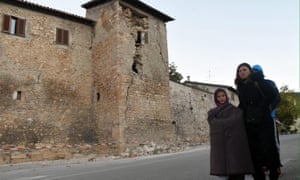Interesting, thank you and Happy Birthday Lin!
I think it's also worth noting that after an earthquake one becomes more sensitive than usual to real quakes. After Loma Prieta in '89, for quite some time I felt quakes smaller than I had before or have since. I no longer recall exactly how with 1989 information technology I knew that (and I must admit that makes me question that assertion); but I do recall thinking amazed thoughts like 'I can even feel a big truck driving by the house, I've sorta become a human seismograph'.
From: "Lin Kerns linkerns@gmail.com [geology2]" <geology2@yahoogroups.com>
To:
Sent: Sunday, November 6, 2016 3:16 PM
Subject: [Geology2] After the earthquake: why the brain gives phantom quakes
https://www.theguardian.com/lifeandstyle/2016/nov/06/after-the-earthquake-why-the-brain-gives-phantom-quakesAfter the earthquake: why the brain gives phantom quakes
Some people caught up in the earthquakes in Italy will experience aftershocks that are all in the mind, says Daniel Glaser
People left homeless by the earthquake near Norcia in central Italy. Photograph: Crocchioni/EPAEarthquakes in Italy have devastated ancient towns and left thousands in temporary accommodation. Luckily no deaths were reported after the country's strongest quake in decades struck last Sunday, but the psychological effects for those who were there could continue for some time.Aside from aftershocks, anyone caught up in the disaster may also experience the uncanny sensation of 'phantom quakes', where it feels as if the earth is shaking when in fact it is perfectly still. This happens for the same reason as 'sea legs' - the swaying feeling you sometimes get when you walk on dry land after time on a boat.The brain's balance system keeps us upright by analysing signals sent by the ears, eyes, legs and feet and uses this data to predict which way is up. Normally, if you make an unpredictable movement, like stepping on something that's lower than you think, your motor cortex quickly adapts as it knows what the real world is like. But experiencing an earthquake temporarily shakes these assumptions, so a misstep can possibly trigger a mini 'earthquake' that is all in your mind.Dr Daniel Glaser is director of Science Gallery at King's College London
--
__._,_.___
Posted by: coyote <coyote2@ymail.com>


No comments:
Post a Comment